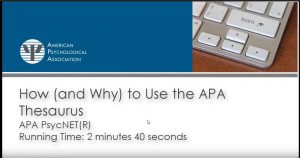On January 17, 2019, the APA PsycNET platform will be upgraded to HTTPS. This enhancement provides our customers with improved security, and current platform users should not see any changes in functionality.
Although APA will implement a permanent redirect from HTTP to HTTPS, institutional subscribers using a proxy solution may need to adjust their configurations to ensure continued access to the APA PsycNET platform. All users should update links or shortcuts to reflect the HTTPS protocol.
What You Need to Know
The move to HTTPS will require about an hour of downtime on January 17, 2019 during which the APA PsycNET platform will be unavailable. Details about this maintenance window will be posted on the platform approximately one week ahead of the release.
To transition your institutional logos for co-branding, move the files for your institutional logo, link resolver, and/or ILL icons to a secure server and then update these image URLs in the APA PsycNET Admin Center (admincenter.apa.org).
The stanza for EZproxy and information about WAM configuration are included below. If you need additional assistance, please visit the Proxy Server Configuration page on the APA PsycNET Help site or contact us.
EZProxy Configuration
If your library uses EZProxy for authentication, it will require an SSL Configuration. Below is the updated stanza for APA PsycNET:
Title APA PsycNET (updated 20190117)
URL https://psycnet.apa.org
HJ content.apa.org
HJ doi.apa.org
HJ my.apa.org
HJ proxies.apa.org
HJ psycinfo.com
HJ psycnet.apa.org
HJ psyctherapy.apa.org
HJ psyctherapyalpha.apa.org
HJ search.apa.org
HJ www.apa.org
HJ www.psycinfo.com
HJ https://psyctherapy.apa.org
HJ https://psyctherapyalpha.apa.org/
DJ apa.org
DJ psycinfo.com
Configuring Web Access Management (WAM)
If your library uses WAM, please coordinate with your campus IT department to ensure your proxy has access to a security certificate. Note that your security certificate must include your proxy URL, which may be different from your campus website address. For WAM configuration, please use the following APA PsycNET URL: https://psycnet.apa.org.


